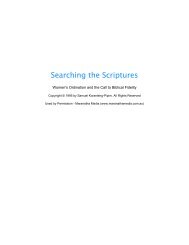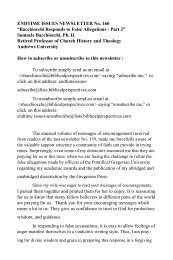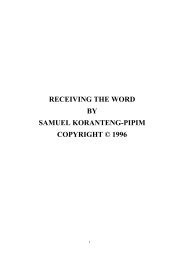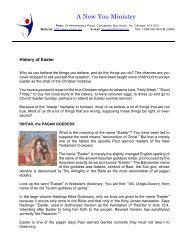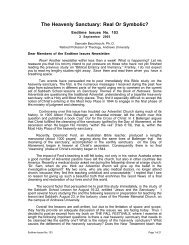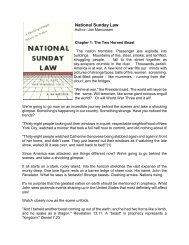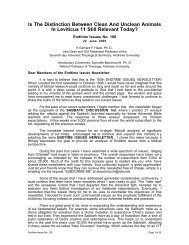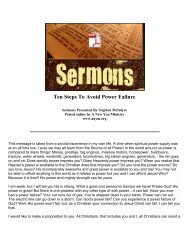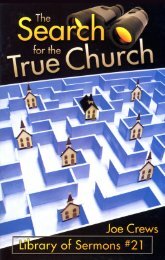Bible Readings for the Home Circleâ1914 - A New You Ministry
Bible Readings for the Home Circleâ1914 - A New You Ministry
Bible Readings for the Home Circleâ1914 - A New You Ministry
Create successful ePaper yourself
Turn your PDF publications into a flip-book with our unique Google optimized e-Paper software.
BIBLE READINGS<br />
BE kind to thy fa<strong>the</strong>r, <strong>for</strong> when thou wert young,<br />
Who loved <strong>the</strong>e so fondly as he<br />
He caught <strong>the</strong> first accents that fell from thy tongue,<br />
And joined in thy innocent glee.<br />
Be kind to thy mo<strong>the</strong>r, <strong>for</strong> lo! on her brow<br />
May traces of sorrow be seen;<br />
O well may’st thou cherish and com<strong>for</strong>t her now,<br />
For loving and kind hath she been.<br />
CHILD TRAINING<br />
{719<br />
719}<br />
1. How should parents train <strong>the</strong>ir children<br />
“Train up a child in <strong>the</strong> way he should go: and when he is old, he will not<br />
depart from it.” Prov. 22:6. “And, ye fa<strong>the</strong>rs, provoke not your children to<br />
wrath: but bring <strong>the</strong>m up in <strong>the</strong> nurture and admonition of <strong>the</strong> Lord.” Eph. 6:4.<br />
2. How diligently should parents teach children God’s Word<br />
“These words, which I command <strong>the</strong>e this day, shall be in thine heart:<br />
and thou shalt teach <strong>the</strong>m diligently unto thy children.” “Ye shall teach<br />
<strong>the</strong>m your children, speaking of <strong>the</strong>m when thou sittest in thine house, and<br />
when thou walkest by <strong>the</strong> way, when thou liest down, and when thou risest<br />
up.” Deut. 6:6, 7; 11:19.<br />
3. What high ideal should be placed be<strong>for</strong>e <strong>the</strong> young<br />
“Let no man despise thy youth; but be thou an example of <strong>the</strong> believers,<br />
in word, in conversation, in charity, in spirit, in faith, in purity.” 1 Tim. 4:12.<br />
4. What duty does God require of children<br />
“Honor thy fa<strong>the</strong>r and thy mo<strong>the</strong>r.” Ex. 20:12. {720<br />
720}<br />
5. What is to be one of <strong>the</strong> prominent sins of <strong>the</strong> last days<br />
For men shall be lovers of <strong>the</strong>ir own selves, covetous, boasters, proud,<br />
blasphemers, disobedient to parents, unthankful, unholy.” 2 Tim. 3:2.<br />
6. Why did God reprove Eli<br />
“In that day I will per<strong>for</strong>m against Eli all things which I have spoken<br />
concerning his house: when I begin, I will also make an end. For I have<br />
told him that I will judge his house <strong>for</strong>ever <strong>for</strong> <strong>the</strong> iniquity which he<br />
knoweth; because his sons made <strong>the</strong>mselves vile, and he restrained <strong>the</strong>m<br />
not.” 1 Sam. 3:12, 13.<br />
7. How should <strong>the</strong> youth be taught to regard <strong>the</strong> aged<br />
“Thou shalt rise up be<strong>for</strong>e <strong>the</strong> hoary head, and honor <strong>the</strong> face of <strong>the</strong><br />
old man, and fear thy God: I am <strong>the</strong> Lord.” Lev. 19:32.<br />
CHILD TRAINING<br />
8. What are some good fruits of proper child training<br />
“Correct thy son, and he shall give <strong>the</strong>e rest; yea, he shall give delight<br />
unto thy soul.” Prov. 29:17.<br />
9. What will result if correction is withheld<br />
“The rod and reproof give wisdom: but a child left to himself bringeth<br />
his mo<strong>the</strong>r to shame.” Verse 15. See Prov. 22:15.<br />
10. Is <strong>the</strong>re danger of delaying correction too long<br />
“Chasten thy son while <strong>the</strong>re is hope, and let not thy soul spare <strong>for</strong> his<br />
crying.” Prov. 19:18. See Prov. 23:13, 14.<br />
11. Does proper correction evidence a want of parental love<br />
“He that spareth his rod hateth his son: but he that loveth him chasteneth<br />
him betimes.” Prov. 13:24.<br />
NOTE.— One Christian mo<strong>the</strong>r writes thus concerning <strong>the</strong> importance<br />
of child training: “Children who are allowed to come up to manhood or<br />
womanhood with <strong>the</strong> will undisciplined and <strong>the</strong> passions uncontrolled,<br />
will generally in after-life pursue a course which God condemns. The<br />
neglect of parents to properly discipline <strong>the</strong>ir children has been a<br />
fruitful source of evil in many families. The youth have not been restrained<br />
as <strong>the</strong>y should have been. Parents have neglected to follow<br />
<strong>the</strong> directions of <strong>the</strong> Word of God in this matter, and <strong>the</strong> children have<br />
taken <strong>the</strong> reins of government into <strong>the</strong>ir own hands. The consequence<br />
has been that <strong>the</strong>y have generally succeeded in ruling <strong>the</strong>ir parents,<br />
instead of being under <strong>the</strong>ir authority. False ideas and a foolish, misdirected<br />
affection have nurtured traits which have made <strong>the</strong> children<br />
unlovely and unhappy, have embittered <strong>the</strong> lives of <strong>the</strong> parents, and<br />
have extended <strong>the</strong>ir baleful influence from generation to generation.<br />
Any child that is permitted to have his own way will dishonor God and<br />
bring his fa<strong>the</strong>r and mo<strong>the</strong>r to shame.”<br />
12. Whom does <strong>the</strong> Lord chasten {721<br />
721}<br />
“For whom <strong>the</strong> Lord loveth He chasteneth, and scourgeth every son<br />
whom He receiveth.” Heb. 12:6.<br />
NOTE.— From this we may learn that all child training should be done<br />
in love, and that proper child training is an evidence of true love.<br />
13. Against what evil should fa<strong>the</strong>rs guard<br />
“Fa<strong>the</strong>rs, provoke not your children to anger, lest <strong>the</strong>y be discouraged.”<br />
Col. 3:21.<br />
NOTE.— Correction should never be given in anger, <strong>for</strong> anger in <strong>the</strong><br />
parent stirs up anger in <strong>the</strong> child. It is well to pray with a child be<strong>for</strong>e<br />
correcting him, and frequently mild but faithful instruction, admonition.<br />
and prayer are all <strong>the</strong> training necessary,—are, in fact, <strong>the</strong> best<br />
training that can be given. But in any case of perverseness, stubborn-




